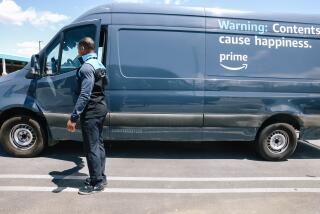Inspection finds safety violations at trucking firm
A trucking company involved in a freeway crash that killed three Ladera Ranch children was cited for 15 safety violations during follow-up inspections by the U.S. Department of Transportation, including failure to file and maintain vehicle inspection reports and allowing drivers to work before their drug tests were complete.
Michigan-based K.W. Express has until mid-September to appeal or bring its operations into full compliance, said Duane J. DeBruyne, spokesman for the Federal Motor Carrier Safety Administration, an arm of the department. The company is making an effort to meet federal guidelines, DeBruyne said.
K.W. Express spokesman Bill Furlow said Friday that company officials are not contesting the findings, which cover March through May and were first disclosed this week in the Orange County Register. Furlow said they welcome the government’s next inspection.
“The point is, they’ve addressed every issue that’s been raised and are prepared for a subsequent investigation, which they believe will confirm that every deficiency has been corrected,” Furlow said.
The company came under scrutiny after one of its big rigs plowed into the back of a minivan on Interstate 5 during stop-and-go traffic in Mission Viejo on May 4, killing Kyle Coble, 5, and his sisters, Emma, 4, and Katie, 2. Their mother, Lori Coble, 30, and the children’s grandmother, Cynthia Maestri, 60, were badly injured and hospitalized for days.
The driver of the big rig, Jorge Miguel Romero, 37, told police he was traveling 55 to 60 mph in the southbound slow lane when traffic suddenly halted and he couldn’t stop in time. He was not hurt in the crash, which remains under investigation by the California Highway Patrol.
About two weeks after the crash, the carrier safety administration informed the general manager of K.W. Express that his company did not have adequate safety management controls “to ensure compliance with the safety fitness standard” and was “operating at an unacceptable level of compliance.”
The company had allowed five drivers to take the wheel before the results of their drug screenings were turned in, and there was no written policy regarding substance abuse, DeBruyne said. Logs kept by drivers on where and how far they had traveled were not consistent with those kept by the company, he said.
And on 60 occasions, drivers did not prepare vehicle inspection reports as required.
Furlow said part of the problem was that the company did not have a record keeper ensuring that logs and other records were properly filed and maintained, and that “all the rules were being followed properly.”
The only violation that dealt directly with the crash was that the company failed to require Romero to take a drug and alcohol test afterward, Furlow said. Under guidelines, an alcohol test should have been administered within eight hours and a drug test within 32 hours, he said.
The company thought Romero did not have to be tested because he passed breath and blood tests give by the CHP after the accident, Furlow said.
“In reality, the fact that law enforcement took the tests did not remove their obligation to do the tests,” Furlow said.
Coble family attorney Jeoffrey L. Robinson could not be reached Friday.
In the week after the accident, he said the Coble family was exploring legal actions against the driver, the trucking company and Caltrans.
--
More to Read
Sign up for Essential California
The most important California stories and recommendations in your inbox every morning.
You may occasionally receive promotional content from the Los Angeles Times.










